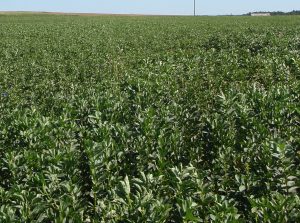Christina Hultman, who is studying at the Agriculture Programme – Soil and Plant Sciences at SLU, will present her Master’s thesis entitled:
Abundance of root nodules on common bean, Phaseolus vulgaris
– a comparison between Swedish fields with and without a recent history of common bean cultivation
Friday 19 January 2018, 9.30–10.30 in room Marken, the MVM-building, Ultuna.
Christinas has performed her master’s thesis project within New Legume Foods.
Summary of the thesis:
Legumes such as common bean, Phaseolus vulgaris L. are climate-smart protein sources which can be part of sustainable agriculture and eating habits to increase the resilience in our food system. Common bean cultivation in Sweden is expanding to new and larger areas where common bean has not been grown before, and it is currently unclear whether farmers should be recommend to inoculate with efficient rhizobia when sowing common bean on fields where the crop has not been grown before.
To evaluate the need for inoculation, this study has examined root nodulation of common bean plants cultivated on fields with and without a recent history of common bean cultivation. Farmer’s fields on the two Swedish islands Öland and Gotland were used for the investigations and a farmer survey was conducted to collect information about the fields. Soil pH, root nodules and plant biomass were measured at pod fill and pods as well as residual plant biomass were measured at full maturity.
There was a clear difference in presence of root nodules between the two types of fields. Both root nodule abundance and proportion of active root nodules per plant with root nodules were significantly higher on fields with a recent history of common bean cultivation than on fields where common bean was not cultivated for at least 20 years. However, neither pod weight nor residual aboveground biomass weights were significantly correlated with number of root nodules or proportion of active root nodule.
These results emphasize the importance of giving recommendations to inoculate common bean seeds with the right species of rhizobium bacteria before sowing, when cultivating common bean on a field for the first time. An additional recommendation might be to decrease the amount of nitrogen fertilization of common bean, since common bean plants grew well even with a very low abundance of root nodules and where many of them were inactive, indicating that soils contained enough plant available nitrogen for good plant growth without nitrogen fixation. However, further investigations are needed before to give firm recommendations on reduced nitrogen fertilization of common bean.

